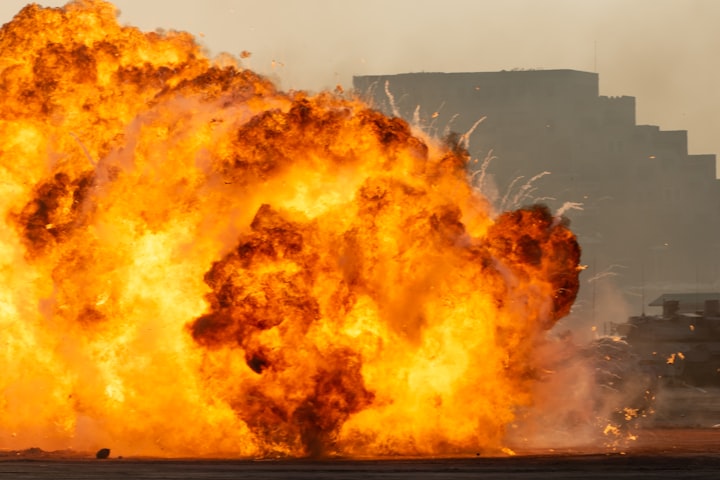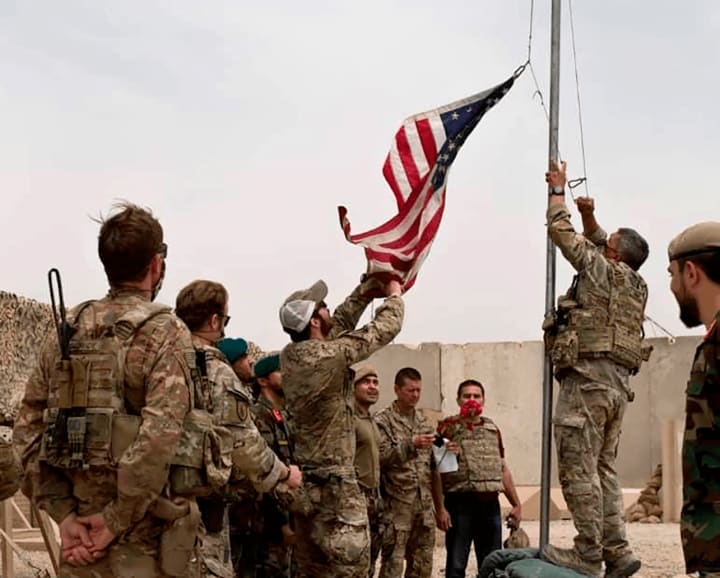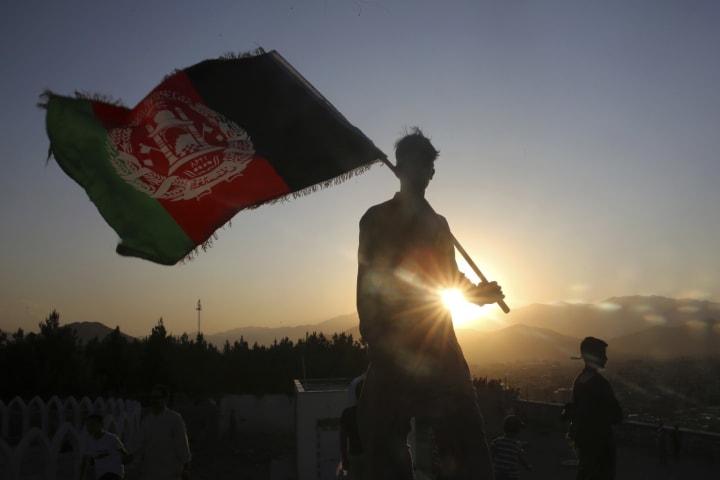
Since the beginning of the war analysts have been trying to estimate the cost of the war versus the benefits that have been realized as a result of the war. Some of the benefits of the war are; refusal to go to war and containment of Saddam would be more destructive; a more stable middle east; a probable drop in world oil prices if the oil markets stabilize after the war. Opportunity Cost Exceed the War On the other side, the war has created problems and loss of opportunity cost.
Is this what the real war being fought is about? Is this the actual war that is going on? There are both aspects crediting the war on terrorism as a war and others discrediting it. This question however is highly relevant and intertwines to other aspects of IR305 such as the changing nature of war (is the war on terror the new type of war?
The war in Afghanistan and Iraq are both considered to be part of the war on terrorism. There is much speculation on whether the war on terror is actually a war. This essay will argue that both points of view are valid. There are reasons which validate the war on terrorism as being considered an actual war such as the fact that an actual decelaration of war was waged by both the US and Al-Qaeda, it can be considered a new way of war, and that ultimately like war, terrorism is a mean to a political end.

But it is still war. It is just a new face of war. However, the war on terrorism is hard to define as an actual ‘war’ for several reasons. One, because it seems the US and the West are just policing and engaging in nation building to promote liberal democracy. Hoffman mentions the second factor, which is vastly important in discrediting the war on terrorism as a war stating that ‘unlike traditional wars, the war on terror does not have a clear end’.
Thus rending the war on terrorism a war. Terrorism is ‘a complex phenomena in which violence is used to obtain political power to readdress grievances ’ In order for one to consider the war on terrorism as an actual war, an actual statement of waging war has had to been made. This is the case with the war on terrorism.
Is there really a war on terrorism and if so according to whom? The USA? Al-Qaeda? And in which theatres and locations are we talking about? The war on terror might be a war on terror in Afghanistan but not in other places. Also the title of the question is quite ambiguous because is terrorism is an act of war, or is war is an act of terrorism?
From Lowe’s narrations and circumstantial evidence, the Korean War was initiated by North Korea and led to what has then been known as “the ‘forgotten war’ or the ‘war before the Vietnam ’ (Lowe 135). One of the more important parts of the book and explanations by Lowe is the part that considers the Korean War, more of a war caused by the international conflict and more importantly of the Second World War instead of the unstable civil society. The domestic factors, although contributed and facilitated the war, the Korean War is more of a war between non-Koreans than Koreans.
On the streets of London, there is no such thing as a ‘war on terror’, just as there can be no such thing as a ‘war on drugs’ He continues by stating that ‘the fight against terrorism on the streets of Britain is not a war. It is the prevention of crime, the enforcement of our laws and the winning of justice for those damaged by their infringement. ” The war on terror could simply be a war against a ‘thing’ such as the war on poverty, drugs, crime tc… There is no real way to defeat, destroy and rid the planet of such immaterial concepts.
Likewise, the war in Iraq has been characterized by too much money funneled out of the United States economy and into the war in Iraq. For, it costs money to buy the war planes, war boats, war ammunitions, the hiring of soldiers to go into Iraq and other military operating expenses (Petras, 2005) . Likewise, the United States war on Iraq has similar characteristics with the war it has fought in the prior years such as the Korean War, the Civil War, World War I and World War II.
Al-Qaeda did declare war on the USA in 1998. The bush administration created the term of the ‘axis of evil’ and the USA did fight a conventional war in Iraq in 2003. The war on terrorism might not be a war in itself but it could be made up and composed by several on going wars such as Chechnya, the government of Sri Lanka versus the Tumult Tigers (which was actually the first country to successfully defeat terrorism), and Mali.
On the other hand, war could be seen as a positive influence. Wars exist because people cannot agree on something. After the war it could be clear and they would agree and not fight anymore. Sometimes war could give freedom to a country. After war the country could become more powerful. If the war was because of land, after they win they have a bigger country with more resources.
” In order for a war to be a war, shouldn’t it have a clear end? Or at least a possible one? The war on terrorism also is discredited as being an actual war because it does not take place on a clear battle space. The director of public prosecutions, Sir Ken Macdonald quoted “London is not a battlefield.
The Korean peninsula used to be a unified nation until the Korean War. The book, The Origins of the Korean War by Peter, published in 1981 was among Lowe’s series of books, which among others take the Korean War or any other World War II event for his topic. In this book, the second edition of ‘The Origins of Korean War’, Lowe was convinced that the war was in fact ignited by North Korea when it initiated the attacks to South Korea.
The Russian Civil War remains one of the more brutal wars in Russia’s history. Considering the brutal combat that the Russian army faced in the horrid conditions of World War One and World War Two, to refer to the Russian Civil War as a more brutal endeavor is a grand claim; however, when one considers the cost of lives and the tearing apart of the homeland, it is not a stretch to lay that claim on the shoulders of the Civil War. What complicates the Bolshevik involvement in the Russian Civil War is the fact that the Bolsheviks prescribed to a state central authoritarian system of government.
However, one of the big differences between the War of 1812 and the Mexican American War is the people’s reactions. The people war begging for war with Britain to save the nation’s honor, while the Mexican American War was not very popular. Another difference is that the Mexican American war is the first war not fought entirely on US soil.
Why was the war of 1812 favored by the south and west and opposed by New England? The War of 1812 is one of the most complex wars of the United States. The war lasted for over two years, and while it ended as it had started, in stalemate, it was in fact a war that once and for all confirmed American Independence.
A. Plan of Investigation. The aim of this investigation is to asses if the Korean War was a product of the Cold war tensions. This investigation evaluates the long and short term causes of the Korean War. As well as looking at the Cold War as a factor for the Korean war I will also go on to evaluate the importance of internal factors such as Korea wanting to become self determined.
World War One poets were normally split into two schools of thought; Pro war and Anti- war. The Pro war poets were often used as recruitments as they told of the glory of war and made it seem like it would be easy and pleasant to fight for the war. Anti war poets told more or less the truth about war although the authors were very angry and you can see this in a lot of their poetry.
On the other side of the spectrum, it may not be considered a war because it does not have a clear end or possible victory, it does not have a confined battle space as regular wars, and it is a ‘war’ against an immaterial concept such as the wars on poverty, drugs, and crime. There is an extensive amount of literature on the subject of terrorism and especially the war on terror. Mia Bloom in ‘Dying to Kill: The Allure of Suicide Terror’ examines the use strategies, successes, and failures of suicide bombing in Asia, the Middle East, and Europe.

It is very difficult to separate war from terrorism neatly. Being a terrorist is a stepping-stone to becoming a politician. Thus because of the very ambiguous relationship and line between war and terrorism, terrorism can be considered as a new way, or military tactic of fighting war. Thus anything that tries to counter attack it can also be considered a war.
The war on terrorism looked under these aspects becomes more difficult to truly accept as a war. It is difficult to answer the question if whether the war on terrorism is an actual war. It appears that there is a struggle between Al-Qaeda fighting secularism, consumerism, and immorality and the US and the West is fighting against backwardness and against groups of people who reject western values and globalization.
Conversely, the end of the Cold War marked by the fall of the Berlin Wall in 1989 resulted in a reduction in the duration of Cold War civil wars of 92% or, phrased another way, a roughly ten-fold increase in the rate of resolution of Cold War civil wars. Lengthy Cold War-associated civil conflicts that ground to a halt include the wars of Guatemala, El Salvador and Nicaragua . See also The Logic of Violence in Civil War War of Independence Wars of national liberation References
DONALD M. GOLDSTEIN This war in Vietnam is, I believe, a war for civilization. Certainly it is not a war of our seeking. It is a war thrust upon us and we cannot yield to tyranny. FRANCIS CARDINAL SPELLMAN Television brought the brutality of war into the comfort of the living room. Vietnam was lost in the living rooms of America — not on the battlefields of Vietnam.
Straight after WW2, another war has evolved. This was called the Cold War. Why called the cold war? This was not violent. There was no “heat”. The fight was mostly words back and forth. This war started in 1945 and finished in 1989. This war was between U. S. A and the Soviet Union (Russia). This war started because they had different political ideologies.
People’s attitudes towards war changed as the war progressed and this is shown in the war poetry which reported about war to the civilians back in Britain. At first these war poems praised war, but when the soldiers realised the truth about war, their poetry changed to show the horrors of war. Eventually poets began writing to ask for the war to stop.
This led to increased inflation, a thing that was experienced even during the US Civil War, First and Second World Wars, Vietnam War among others. War induces inflation which is strongest in war zones but also to neutral countries, causing disruption and scarcity of resources, for example the US during the World War II. In addition, as war continues in the present day, inflation continues to increase driving the currency to worthlessness.
After keeping on it for over a decade the two states agreed upon a settlement stating how big military forces they each were maximum allowed to have. Also Chine were added into this agreement as they also became Communistic after the Second World War. There were two hot wars during the Cold War. The war in Korea and the war in Vietnam.
The war escalated into a world war in 1760 when France and Britain declared war on each other. It was sparked in America, not Europe, but Great Britain spent a lot of money in helping to fight the war and support to their colonies in America and the colonies participated fully in the war. Main reasons for the French and Indian War Britain and France had long been in a competition for territory in North America.
After the long discussion on the origin of the war, Lowe concluded by sharing how North Korea and South Korea was able to settle the dispute and how eventually the war ended. I agree with Lowe in saying, that even after twenty years in war, the Korean peninsula was reunited, although, it cannot be denied that until today, wounds caused by the war permanently marked with scars the relations between the two nations. Although the violent wars have stopped, it cannot change the fact that it left Korea in agony.
The Hundred Years War , a critical part of our history. It was dreadful and never ending . This war changed the social and economic status of many countries over this long period of time. Many people died, if not from the war then from the frightful disease called The Black Death. The war changed the English and France people’s lives forever.
The other factor that triggered the war was the trade sanctions that the Athenians gave to the Megarans who were Spartans allies. As a result of this, Spartans and the Athenians fell into another war which was named Peloponnesian war after the Peloponnesian league which was led by the Spartans. This war lasted for over twenty seven years and it occurred in three different phases namely: Archidamian War, the attack of the Syracuse in Sicily and the Decelean war or the Lonian war.
Alter the Political, Economic, and … The French and Indian War, a colonial manifestation of the same forces … In what ways did the French and Indian War alter the political … apush5.blogspot.com/…/in-what-ways-did-french-and-indian-war.html Sep 29, 2007 – The French and Indian War altered the political, economical, and … This took a toll on the political relationship between Britain and the … In what ways did the French and Indian War alter the political … wiki.answers.com › … › French and Indian War In what ways did the French and Indian War alter the political economic and ideological relations between Britain and her colonies? In: French and Indian War … [PDF] AP 07 US History Form B q2 – AP Central – College Board apcentral. collegeboard.com/apc/public/…/ap07_us_history_formb_q2.pd… The French and Indian War (1754–1763) altered the relationship between Britain and its North … War enabled Britain to implement greater colonial political controls.
Major Players in the French and Indian War The French and Indian War was primarily England and the American colonies against the French and various Native American tribes in America. As France expanded its colonies along the Ohio River, and Britain ventured further into the mountains and discovered them, it was inevitable that there would be competition, tension and eventually war between the two colonies. This war has come to be known as the French and Indian war, but it has various other names such as ‘The Seven Year War’ or ‘The War of British Conquest’.
New England leaders, who were mostly Federalists, met secretly in Hartford, Connecticut during the war. This meeting was known as the Hartford Convention, in which the delegates discussed ways to protest the war. They objected to the war mainly because they didn’t want New England’s shipping trade to be ruined by the war.
The War of 1812 and the Mexican-American War are two wars that physically appear two opposites. The War of 1812 involves plenty of naval battles and a few major land battles, while the Mexican-American War involves numerous land battles and few, if any, naval battles. However there are numerous similarities.
I do not think so. As you can see, there are many bad and good sides of war. Overall I think wars are bad, because all these positive things are still not worth of millions of lives. And the good sides are if you win the war but that is not 100% sure. And even if things are resolved after the war, we are humans and we constantly want more.
In this context terrorism fits in accordance to his definition as terrorism too can be considered part of war. Terrorism can be considered a tactic or act of war, or war a tactic or act of terrorism. For example the French used torture during the Battle of Algiers, the US uses terror tactics itself such as Abu Ghraib.
There have been clear objectives set out and enemies to defeat. Although this enemy is invisible, and the way of fighting the battles are different (due to the asymmetrical aspect of the war on terror) it does not mean this is not a war. The rules have changed, the battle space as well, the way of thinking of the enemy and war has changed drastically.
), the different types of warfare (is the war on terror the new western way of warfare and terrorism the Arab way of warfare? ), and the topic of risk societies (are we breeding more terrorism by fighting the war on terror, thus creating more risk). All of these various aspects of IR305 are relevant to the topic of the war on terrorism.
Civil wars since 1945 In the 1990's, about twenty civil wars were occurring concurrently during an average year, a rate about ten times the historical average since the 19th century. However, the rate of new civil wars had not increased appreciably; the drastic rise in the number of ongoing wars after World War II was a result of the tripling of the average duration of civil wars to over four years. This increase was a result of the increased number of states, the fragility of states formed after 1945, the decline in interstate war, and the Cold War rivalry.
About the Creator
Full Circle
Inspired to inspire!






Comments
There are no comments for this story
Be the first to respond and start the conversation.